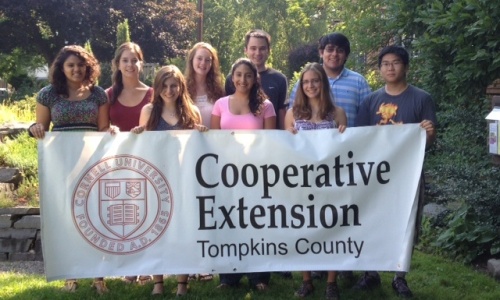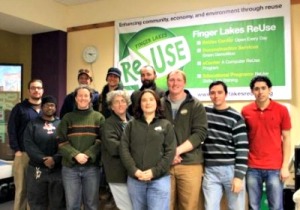By Peter Bardaglio, Senior Fellow, Second Nature
Welcome to the June-July 2012 issue of the TCCPI Newsletter, an electronic update from the Tompkins County Climate Protection Initiative (TCCPI).
Get Your GreenBack Tompkins Heats Up

Karim Beers took over direction of Get Your GreenBack Tompkins (GYGBT) last month and hit the ground running, making sure that the county’s energy saving campaign did not miss a beat. Karim just received his masters degree in regional planning at Cornell University and brings with him a wealth of experience in education, community development, and planning. He has coordinated community education programs in Columbia and Spain, and taught social studies in the Philadelphia public school system.
As the campaign coordinator for GYGBT, Beers has laid out ambitious plans to inspire community members to take steps to save energy and money in the areas of food, building heat and lighting, transportation, and waster. Having started out with transportation as the focus in May, GYGBT declared June as “Waste Reduction Month” and the “Step of the Month” is to Buy Used.
Over a dozen stores around the county have joined the “Second Hand Saves” campaign by offering special discounts and raffle prizes to customers who shop second hand in the month of June. ”Second hand shopping makes sense for your pocketbook and the planet,” Karim points out. “Used goods can be purchased at a fraction of the price of new items because the cost no longer includes production and long-distance shipping.”
Buying used goods reduces the need to use natural resources and keeps items out of the landfills. According to the Finger Lakes ReUse Center in the Triphammer Mall, 90 percent of what we throw away can be reused.
Another advantage of second hand shopping, Beers notes, is that it keeps money in the local economy. Almost all reuse and resale shops are locally owned and provide jobs in their communities. Mama Goose, a second hand children’s clothing store located in Ithaca’s West End, reports that $84 out of every $100 spent at their store stays local.
Reuse also helps to support a number of not-for-profit service organizations. SewGreen, which runs a reuse sewing store in downtown Ithaca, is a perfect example. The store’s proceeds help support a free teen apprenticeship program and job training for lower income and at-risk youth.
For more information on Second Hand Saves and other energy and money saving ideas, go to getyourgreenback.org.
Student Energy Corps Hits the Streets for 4th Summer
Tompkins County Energy Conservation Corps (TECC) has just entered its fourth summer of promoting home energy efficiency upgrades across the county. Led by recent Cornell graduates and community energy educators Shawn Lindabury and Dana Hills, the Energy Corps program has demonstrated the enormous potential of energy efficiency to create lasting jobs, reduce greenhouse gas emissions, and provide savings to homeowners.
According to “Upgrade Upstate,” New Yorkers spend on average $2,600 per year for home heating, electricity, and hot water. By upgrading their homes, households can save between 20 and 60% – up to $1,500 a year.
TCCPI worked closely with Cornell Cooperative Extension of Tompkins County to launch the Energy Corps, which consists primarily of students from Cornell, Ithaca College and Tompkins Cortland Community College. Energy Corps offers outreach programs to help residents take advantage of incentive programs and provides personalized support to help people make upgrades.

The Tompkins Energy Corps has raised the awareness of county residents about the importance of home energy efficiency. Photo credit: Cornell Cooperative Extension Tompkins County
Initially, Energy Corps focused on creating a network of 125 community leaders who understood the benefits of energy efficiency, starting with their own homes. In 2010, the Energy Corps shifted its focus to on door-to-door CFL distribution programs, including “Lighten Up Tompkins” (fall 2010) and “Lighten Up Ithaca” (fall 2011). Together 900 volunteers from Cornell University distributed 17,000 energy saving bags to residents throughout Tompkins County, the largest CFL distributions in New York State history.
Most recently, the Energy Corps has developed innovative community education programs, including social marketing initiatives with the Get Your GreenBack Tompkins campaigns, giving community presentations, collecting video testimonials, organizing Energy Teams, and hosting “Tighten Up” events, in which neighbors share information about energy upgrades over potluck dinners.
Rather than focusing on negative messaging about the threat of climate change, the Energy Corps has tapped into the positive aspects of energy efficiency such as strengthening community, saving money, making homes more comfortable, and supporting a local green economy, in order to inspire community-wide action. Energy Corps also guides community members through the energy upgrade process and acts as neutral third party between customers and energy contractors.
Over the past few years, the Energy Corps has trained more than 60 student interns, providing them with valuable leadership skills and practical experience in home energy efficiency that lead to good jobs after graduation. As Energy Corps coordinator, Dana Hills explains, “Not only have we impacted Tompkins County residents, but students from nearby schools have become an integral part of the county’s energy and economic future.”
For more information about getting a low-cost energy assessment, please visit:http://www.upgradeupstate.org/home
To learn more about the Tompkins Energy Corps, please visit:http://ccetompkins.org/energy/programs-workshops/energycorps.
K.C. Alvey, Assistant Coordinator, TCCPI
One Last Thing
This month’s reports on Get Your GreenBack Tompkins and the Tompkins County Energy Corps underscore the strength of the collaboration between our campuses and the larger community in building a more resilient infrastructure for all county residents. Given the degree of adaptation likely to be required in the years ahead as global warming accelerates and our energy system shifts, this ongoing work is critical.
A recent article in a United Nations University publication, “Universities Co-Creating Urban Sustainability,” examines how higher education institutions are collaborating “with diverse social actors to trigger and then drive the sustainable transformation of a specific region, city or community.” It highlights 13 different initiatives along these lines from around the world, including TCCPI, that are “driving the transition to more resilient and environmentally sustainable towns and cities.”
TCCPI received additional recognition at this year’s American College and University Presidents’ Climate Commitment Leadership Summit in Washington, D.C. Ithaca’s Mayor Svante Myrick and I had the opportunity to participate in a luncheon panel discussion on “Uniting Higher Education and Communities for a Sustainable Future.” It was a lively discussion and, based on the number of questions from the audience of presidents and other senior higher education leaders as well as interested individuals who approached us afterwards, there is increasing recognition of how working together can help us move beyond the constraints of the traditional town-gown paradigm.


